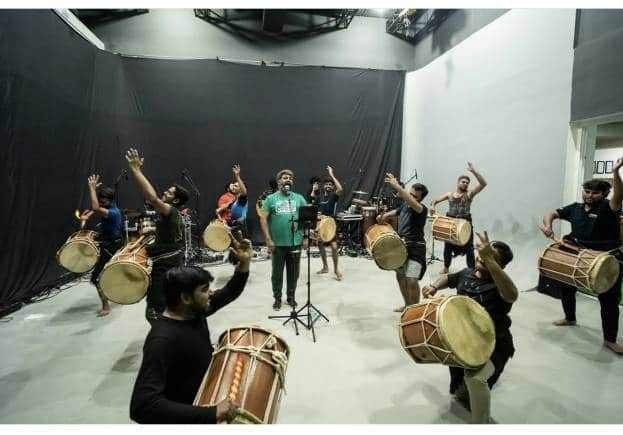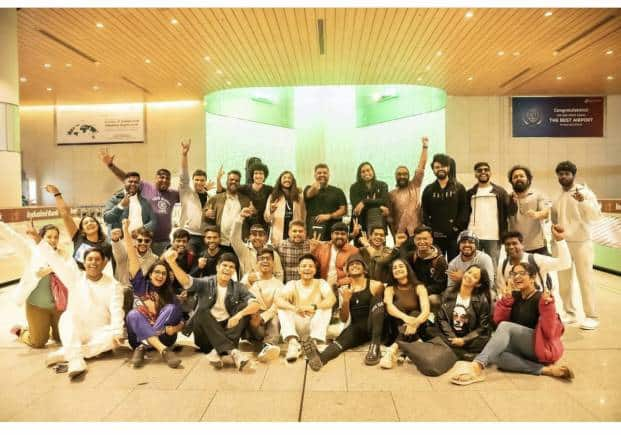



Frontman of the multilingual contemporary folk rock band, Raghu Dixit Project, Raghu Dixit is a singer-composer, producer, and film score composer. Ahead of his performance at the international music festival Lollapalooza, in Mumbai on January 27, he speaks about performing at his first music festival after the pandemic, about consciously staying away from film music and concentrating on his own music, about the North and South Indian music industries, and more. Edited excerpts:
 Rehearsals for the Dollu Kunitha act for Lollapalooza on January 27, Mumbai.
Rehearsals for the Dollu Kunitha act for Lollapalooza on January 27, Mumbai.
How have the rehearsals been so far?
It's been exhausting, but creatively, extremely satisfying. To bring 35 people on stage, coordinating with everybody and making sure that we are all syncing in both the philosophy, idea and the creative inputs, has been a phenomenal experience. Each of the artists working on this project has been so professional. Today (Jan 25) we did the final run, and it's looking great, sounding great. It took a lot of people’s contribution and generosity to make this happen. We have six people in the band, and two guest musicians, John Paul and Pramath Kiran. John plays acoustic instruments like the banjo, ukulele, bazooka and the acoustic guitar and Pramath is playing both Indian classical and Afro-Cuban percussion instruments. There is also an ancient form of folk dance from Karnataka called the Dollu Kunitha where robust men carry huge dhols tied up against their waist, play and dance and this musical expression and physical dance is tiring and needs tremendous energy. Any function that must start in a traditional way will surely have Dollu Kunitha as the opening act, it’s that auspicious. We are getting a bunch of students from the Agricultural University of Bangalore’s Team Bhumika who will be performing live with us. That was challenging because these students are not used to other beats like our contemporary rock beat. It turned out amazing.
What does performing at Lollapalooza mean to you?
It means a lot because since COVID-19 we have not played at any music festival, only done solo concerts. This is an international music festival with so many amazing artists on stage and to be a part of that is great. I see Lollapalooza as a great opportunity to bring in something new that we have not tried in many years, a whole new level of performance. We have Gyandev Singh, lighting and visual designer, who is collaborating with us to bring in visual energy. Vinod Bangera who is one the best audio engineers got his biggest mixer for us to practice. Preparation has been quite meticulous; I hope it leads to bigger things after the performance.
Your music has an amalgamation of folk elements and modern sounds — what inspires you to do this?
Well, it is a representation of who I am. I grew up in a very traditional TamBrahm family in Mysore and I learnt Bharatanatyam as a child for 17 years till I was 23. When I went to college, I encountered Western music and guitar and most of my peers who had been listening to western music introduced me to the most popular acts of that time from Michael Jackson, George Michael to Phil Collins, Led Zeppelin, to Guns and Roses, Metallica, Pink Floyd. So I would listen to this during the day and go back to my classical dance and music class in the evening. When I was just shaping my interest in music, I grew up with these two polarised cultures and it is only natural for me to bring all this into my music. Much later, when we started touring abroad and thanks to the internet, listening to other kinds of music became very easy, watching other bands perform brought in elements which I thought was great. Now I have songs from every style around the world right from Latin to Afro Cuban to Indian classical, Indian folk rock and roll.
The advent of AI in the music industry. What do you have to say about that?
Everything is good and everything is bad, depending on how we use it. When CDs burners were discovered, we thought that the music industry would sink. It didn’t. The way we access music has changed drastically. I hope AI will lead to great innovations which can be used in a bad or good way. Every technological discovery that we have come across has two sides to it, just like the internet is great but there is a dark web also. Hopefully we will learn to use AI more positively and it could lead to some incredible innovations in the field of music. We might get to listen to some great music. But nothing, nothing can imitate what the soul feels. And as long as people have feelings, we will all still look for the human connection. It needs a human being to use AI in such a way that it touches the soul of another human being. If that can be achieved through AI then it will be great otherwise it will die a natural death.
Kannada cinema, Malayalam films, and Bollywood including the Train Song (Gully Boy), title track of Bewakoofiyaan, Darmiyaan (Chef) — when it comes to creating music, how are these industries different in the way they work?
They are not at all different. They are all equally organized and equally disorganised. It boils down to the individual whom you are working with. It has nothing to do with language or culture. There are completely brilliant and creative people in every language and there are extreme opposites also. It’s your luck who you end up working with eventually. I have had great experiences and also had bad experiences in every industry. It doesn’t really matter which language, they are all doing good things and I feel it is the same across India.
 Raghu Dixit with all the musicians who will also perform at Lollapalooza on January 27 in Mumbai.
Raghu Dixit with all the musicians who will also perform at Lollapalooza on January 27 in Mumbai.
You will be 50 next year and you have been in music for around two decades — what has been your standout moments and biggest takeaways?
Wow, good question! The biggest takeaway has been that knowing how to play an instrument and singing live on stage will never go out of fashion, no matter how many technological advances come and go. That one element of a human being standing on stage and rocking a crowd and controlling their emotions with his music and stage presence that will never go out of fashion. As long as one can do that, he or she can stay relevant forever. Another thing is that — a lot of artistes use tracks on stage or lip sync on stage or sing on something called Plus one. All of that has come in and yet we are able to hold on to our crowds and our fans and that has proved for me that as long as we are true artistes on stage, we will never go out of fashion. We’ll always be relevant as long as we come up with new material every now and then and speak to the audience and make people happy. And hopefully, fans will find our music to be the background score for their lives.
Discover the latest Business News, Sensex, and Nifty updates. Obtain Personal Finance insights, tax queries, and expert opinions on Moneycontrol or download the Moneycontrol App to stay updated!
Find the best of Al News in one place, specially curated for you every weekend.
Stay on top of the latest tech trends and biggest startup news.